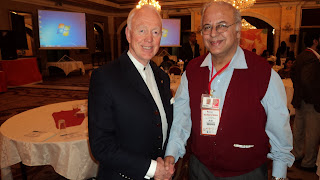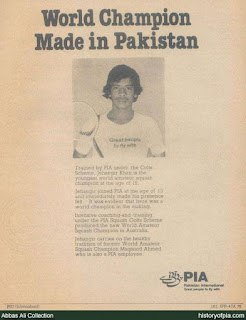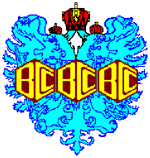TONY BUZAN COMES TO TOWN (Think Ingeniously – Enhance Creativity – Boost Productivity)
TONY BUZAN COMES TO TOWN
Think Ingeniously – Enhance Creativity – Boost Productivity
By Adil Ahmad,
Editor, Octara
www.octara.com
PULL QUOTE: “Having struggled through my student days, I was
determined that everyone should have the benefit of this liberating thinking
tool” – Tony Buzan
In measured manner the father of Mind Maps put forth his
treasured thoughts that have brought about a global revolution in the way the
human brain can be optimized for knowledge retention. Over 200 high powered
delegates registered for this one-of-a-kind seminar, representing a cross
section of Pakistani trade, commerce and industry. Most were familiar with the
content on offer. Mind Mapping has been around for the last four decades. But
the occasion was unique for it offered the privilege and pleasure of hearing it
from the horse’s mouth, as it were.
Octara’s latest offering, Tony Buzan, is an international
celebrity and the world’s leading author on the brain and learning, who has
authored and co-authored over 100 books. Mind
Mapping® is all about optimizing the comprehension and retention of information
and knowledge, uploaded into the brain through the use of key words and colorful
imagery. Mind Mapping® has been called the Swiss Army Knife for the Brain. It
is now used by major corporations world-wide to improve thinking, innovation
and productivity.
This was Tony’s first trip to
Pakistan Pakistan Pakistan in England Pakistan
Tony’s audience was alive and
radiant throughout the day as it imbibed with relish Tony’s illuminating
discourse, peppered as it was with entertaining and informative examples from
his vast store of experience. A day earlier Tony had been given the nickel tour
of Karachi
Best Restaurant in the World!
The nickel tour also included
dinner at the Bar-b-que Tonite restaurant that seems to have floored Tony completely,
but in a good way! “It is the best restaurant around the world that I have ever
been to in my entire life,” he said. “The food was phenomenal, and the smell
captivating. The place was full with families and children, and I felt totally
secure. I was very happy, and I ate, and I ate, and I ate some more, course
after course after course! It was some of the most delicious food that I have
ever had.” High order praise indeed which Sardar Rahim and his high performance
crew at Bar-b-que Tonite can justifiably feel proud of.
Brain’s potential is phenomenal
Map out your thoughts, says
Tony. “The memory system is based upon imagination and association, and was
practiced by ancient Greeks many centuries ago. I realized that one-colour
monotonous note-taking was creating a gigantic logjam in the individual and
collective global brain that needed a new note-taking and thinking tool to
unblock it.”
Information overload is an
illness of the Information Age and causes stress, he says, talking about ‘death
by power-point’! Knowledge management requires managing the mind. “We use less
than one percent of our brains. The brain’s potential is phenomenal.” Tony’s
been a winner of the World Memory Championship. Recently a 45 years old man
memorized 202 digits to win it, and remembered those digits ten hours later,
repeating them backwards! And this man, said Tony, had been called stupid in
school!
The memory is an infinite
database, and Tony’s objective is to help other people help themselves. In
school the teaching of memory is the opposite of how memory works. “Leonardo Da
Vinci said that in some way everything connects with everything else. Children
are interested in everything. They’re the fastest learners and the most
creative. Babies are a beautiful example of scientists given their curiosity
and eagerness to experiment.”
I finally got to sit down
with the man himself for an interview after the day’s proceedings had come to
an end, amidst some apprehension that he might be too tired to engage with me.
But Tony was fresh as ever. When passion and purpose intersect, they make for
an inexhaustible store of joyful energy. Everything about him was available in
the public domain, a fact that he alluded to gently, but humored me nonetheless,
and took me down memory lane to how it all began.
Wither Brain Manual?
As a young child, said Tony,
he had loved the idea of taking notes and of learning. But by the time he was a
teenager his thinking was already getting into a mess, and he began to hate
anything to do with study, especially note-taking. He noticed the extraordinary
paradox that the more notes he took the worse his studies and memory became. He
went to the librarian looking for a book that would help him memorize better,
and was directed to the medical section! While there was a manual on how to use
all manner of gadgetry, there was no manual available on how to use the brain.
In an effort to improve
matters Tony began to underline key words and ideas in red, and to put
important things in boxes. Magically, he says, his memory began to improve.
While in school at age 7 Tony experienced a situation that caused him quite
forcefully to question the validity of the teaching system. His best friend
loved Nature, as also did he, but his best friend was by and far more knowledgeable
than he was, Tony felt. His friend could walk out into the woods and identify
by flight pattern different butterflies and birds. But back in school he was
called dumb and a dullard. One day there was a test on Nature, and Tony topped
the class while his best friend bottomed out.
Questioning the System
“I knew that he knew more
than I knew, and I was supposed to be #1. But I knew I wasn’t #1. He should
have been #1. I was 7 years old at the time and it got me angry and motivated.
It made me ask the question what is ‘smart’? What does ‘intelligent’ mean? Who
has the right to say that a child is unintelligent? So I investigated.”
Tony says that while taking
notes he had been taught to use one colour and write in lines, which he found
boring and rigid, and so his grades fell. It led him to explore how his brain
really worked. That led him to the use of colours that helped him remember
better, and to the use of keywords that connected the ideas together.
“So, I got better and better,
and my grades improved and time spent studying grew less and less. I was trying
to rescue myself by using a learning tool, a note-taking method that was
clearly helping me. I used to say to my friends ‘hey! Look at this! Try this!’
and they would try it and say ‘it really works! From near failing marks I am
now getting Bs and As!’”
Working with ‘delinquents’
Clearly Tony was onto
something, and before long he had started teaching in school. “I was working
with delinquent, wild and poor children, and I was told that they weren’t very
bright and wouldn’t go to university. That did not make sense to me. Learning
to speak is more difficult than playing the piano concerto! It is a
phenomenally complex thing that the brain can do.”
When children begin to mind map they discover they are more intelligent
than they were told they were, says Tony. “They realize they’re more creative,
and learn how their brain works. They realize that if they got hit on their
head then they would get concussion and bruise and damage their brain cells.
Now they do not wish to damage their bio-computer, and do not want to fight
anymore.”
Tony says that just because
the kids speak with a ‘funny’ accent they shouldn’t be stereotyped as dimwits.
“When people speak with an accent they are speaking perfectly in the way people
in their area speak. They make brilliant students. When I taught these kids I
asked them what their daydreams were, and helped them mind map. Their mental
clarity improved tremendously. When they mind mapped their subjects they went from
the bottom of the class to the top, to first class.”
Bomber Planes & Doodle Bugs
Tony Buzan was born in London
Tony finished secondary
school and went to university on a scholarship to the University of British
Columbia (UBC) in Vancouver ,
Canada Simon
Fraser University
BBC lends a hand
He did not have a branding
business plan, says Tony. “I realized in the late 1960s that every student
needed to know mind maps, so I taught at schools and universities, and did
radio interviews.” In 1973 the British Broadcasting Corporation (BBC) found out
what he was doing, and asked him if he would do a half hour program on the
brain and note taking techniques.
“I went to a meeting with the
head of education at BBC Television. He said they wanted something on brain cells,
memory, problems with memory, how to use the memory system, reading, reading
faster, concentration, note taking and mind map. I told him we would need to do
10 programs! He said ‘Jolly Good! Ten programs it is!’ Each branch of the
brainstorming session’s mind map generated a half hour program in a ten part
series. He then asked if I could write a book on that as well, and I said yes.
He said ‘Jolly good! Ten programs and a Book!’ and we shook hands. This was in
1974. These 10 programs went on air 3 times a year on BBC from 1974 until 1989.
People were calling me from around the world asking if I would give a lecture,
or teach their children, or work with the government, or work with Fortune 500
companies. So I have traveled around the world from 1974 to 2013, and the end
of the road is so far in the distance.”
Shoveling manure!
Tony’s first job after graduation was working on a farm as a laborer,
shoveling chicken manure. His other job options had been selling insurance
and mortgage funds, but neither of those he felt needed a graduate degree to
do. The farm job attracted him since he loved animals and Nature. He asked the
lady at the employment agency how much the farm job paid, and says she got very
angry, accusing him and other students of being interested only in the money. “I
told her I have 20 years of education on my CV, and I want to know why the
Universe is offering me a job shoveling manure! I worked at it the entire
summer, and it was one of my favorite jobs. It was wonderful exercise in the
outdoors and fresh air. I loaded the lorry up with manure, drove it into the
woods, and emptied it so the trees had the fertilizer.”
Also, while doing physical work Tony says he could think. “Doing
paperwork in a bank one cant think. Out there in Nature, using my body, I could
really think.” Tony has been partial to rowing on the sporting front, in
particular sculling, which he calls motion yoga. Living near Marlow-on-Thames,
he is inspired by Sir Steven Geoffery Redgrave, arguably the world’s greatest
rower with 5 Olympic gold medals (1984 to 2000), and who’s been world number
one for 25 years. Asked how he did it, Redgrave said rowing is all about the
brain, and the way the athlete thinks and envisions the goal. He said he
trained his brain on how to think and synergize the brain and body.
Tony is also fascinated by swimming, even though earlier on he had been
scared of it. He taught himself how to control his breath while underwater, and
learnt the freestyle crawl and backstroke.
Fathering ‘thought gene’ children
Tony Buzan never married. Had he married, he says, he would have liked
to have fathered 20 children, each a specialist in a different field like
music, athletics, poetry, science, and so on. Instead, Tony has focused on
global mental literacy, and fathered millions of children with his thought gene
rather than the physical gene. “Hundreds of millions of mind maps have been
done by children, and I think of them as my children,” says Tony.
Since 1974 and the launch of the ‘Use Your Head’ ten-part television
series on BBC, he has devoted his time to lecturing and teaching about the
theory and application of Mind Maps, says Tony. “Having struggled through my
student days, I was determined that everyone should have the benefit of this
liberating thinking tool.” Thank you Tony Buzan.




Comments
Post a Comment